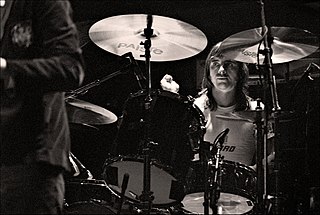A Quote by John Updike
Nothing seems to matter quite as much. I no longer think about death in the concentrated way I once did. I don't know? you get so old and you sort of give up in some way. You've had your period of angst, your period of religious desperation, and you've arrived at a philosophical position where you don't need, or you can't bear, to look at it.
Related Quotes
You have to be very productive in order to become excellent. You have to go through a poor period and a mediocre period, and then you move into your excellent period. It may be very well be that some of you have done quite a bit of writing already. You maybe ready to move into your good period and your excellent period. But you shouldn't be surprised if it becomes a very long process.
There is a period in your life when you need your parents and a period in your life where you only think you need your parents. Something clicks, there's a little switch that goes and your parents, who had been the wind beneath your wings, through no fault of their own can start to oppress a bit, can start to stop you doing stuff.
In fact I no longer value this kind of memento. I no longer want reminders of what was, what got broken, what got lost, what got wasted. There was a period, a long period, dating from my childhood until quite recently, when I thought I did. A period during which I believed that I could keep people fully present, keep them with me, by preserving their mementos, their "things," their totems.
There are some pretty obvious ways of benchmarking creativity. One way is to perform what I call a creativity audit, which is to look at your capabilities and look at your performance and examine the percentage of revenue that comes from products that are less than five years old, less than three years old and that are current with the present accounting period. You can then compare those figures to those of your competition along the same axes.
When you look back on a historical period of music, it seems so obvious to you what the characteristics of it are, but they're not obvious at the time. So, when I look back at my own work, I could easily write a very convincing sort of account of it that made it look like I had planned it all out from day one and that this led logically to that and then I did this and then that followed quite naturally from that. But that's not how it felt.
I think, for me specifically when it comes to music, I don't think that I need any persuading to think about it. It's always kind of in the back of your mind and - but I think it's part of who I am and always will be, I mean, in a very cellular way. When you grow up doing, you know, one thing, I think you get to this place where you want to try new things. And I do think that we live in the type of world where people get comfortable with you in one way, and so seeing you in a different way, it takes some time.
You can revisit - the wonderful thing about my job is you can revisit your 22-year-old self or your 24-year-old self any particular night you want. The songs pick up some extra resonance, I hope, but they're still - they're there, and I can revisit that period of my life when I choose. So it's quite a nice experience.
I think often people fall into the breadth trap of wanting to do too long a period of time, and obviously there's this sort of algorithm of how much depth you can put into something times how much of their life you're trying to show. My attitude has always been, I'd rather show a briefer period of time in more detail than a longer period of time in less detail.
Whatever he says, let his inner resolution be not to bear whatever comes to him, but to bear it 'for a reasonable period'--and let the reasonable period be shorter than the trial is likely to last. It need not be much shorter; in attacks on patience, chastity, and fortitude, the fun is to make the man yield just when (had he but known it) relief was almost in sight.
It's kind of the period of your career where as a fighter, you need some sort of validation from time to time. I mean, winning matches and going off to the next one, without really having any direction, it's fun, but it's good to have a period where you can say "Ok, I won a title. Ok, I got picked up by a big organization." So every step in there is important.
That's what just hit me: How you really can't have everything. You have to give up the old to get the new. You can't be the child and the mom at the same time. You can't be your young self and your old self at the same time. You can't know what you know now and feel the way you did then. You can't, you can't, you can't.







































